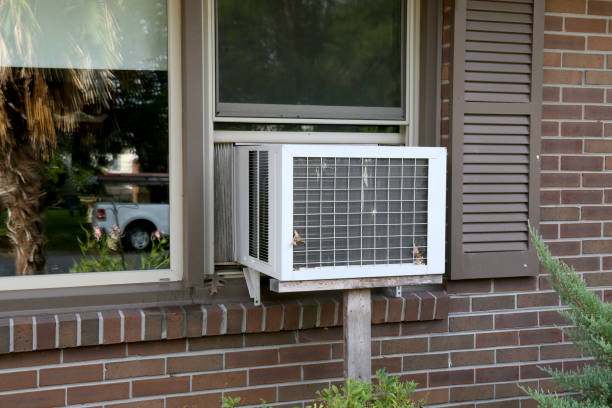Why Is My Window Air Conditioner Making Noise?
You settle into your favorite chair only to hear your window air conditioner complaining with buzzes, rattles, and thumps. A noisy window air conditioner may simply mean a loose screw, or it may warn of something serious inside the unit. At Lancaster Plumbing, Heating, Cooling & Electrical, we guide homeowners in Lancaster, Lititz, and Mount Joy through each type of noise so you can decide when a quick fix is enough and when to call a professional. By the end, you’ll know how to interpret those sounds and restore peace to your home.
Common Window AC Noises and What They Mean
A window AC making a buzzing noise often points to electrical troubles. Loose wiring or a failing capacitor can hum loudly as current arcs over corroded connections. If the sound seems more mechanical, like a thumping or clunking, debris could be trapped in the condenser coil, or an internal bracket may have worked loose over time.
Clicking noises usually accompany everyday cycling of the thermostat relay, but rapid or uneven clicking could signal a stuck switch or control board issue. High-pitched squeals come from worn fan bearings rubbing the housing, and that extra friction warns that the motor may be nearing the end of its life. A window AC that rattles like loose hardware requires you to inspect mounting screws and support brackets. When you match each sound, buzz, click, squeal, thump, to a likely cause, you can target your troubleshooting efforts and avoid needless panic.
Is That Noise Normal or a Sign of Trouble?
Some sounds belong to a healthy window AC. A low hum while the compressor runs and a slow, even whoosh of air through the vents are typical. Light pops and ticks, especially during startup, often come from the metal housing expanding or contracting as it heats and cools. If the noises follow the same pattern each heat cycle and don’t grow louder or more frequent, they may fall under regular operation.
However, if you hear the unit groan under load, if the hum turns to a rattle that shakes the window frame, or if squeals prolong through each cycle, consider that a warning. Airflow restrictions, electrical faults, or mechanical wear can worsen rapidly, leaving you with a totaled unit or flooded room if cooling stops unexpectedly. In short, normal noise is light and consistent; troubling noise grows louder, shifts in pitch, or changes in timing.
Quick DIY Checks to Silence Minor Noises
Before calling for AC repair, start with simple steps. Turn off the power and remove the front grille. Vacuum dust and debris from the evaporator and condenser coils; trapped dirt can throw fan blades off balance and cause rattles. Tighten visible screws on the fan guard, mounting brackets, and control panel. Inspect the filter and replace it if it looks gray; restricted airflow forces the fan motor to run louder.
Lubricate fan bearings by adding a few drops of electric motor oil into ports on the fan housing. Clear the condensate drain line by gently flushing it with a vinegar solution to stop dripping noises. Once you perform these tasks, run the unit briefly and listen. Often, these quick fixes restore the quiet operation you remember when you first installed the AC.
Deeper Mechanical Issues Behind Persistent Knocking
If your window AC makes a banging noise that persists, the compressor may be to blame. Inside the compressor, pistons and valves pump refrigerant; when those parts wear or lubricants break down, they collide and thump against the housing. Steam cleaning or vacuuming won’t reach inside that assembly, so it’s time for professional attention. Similarly, loose or broken internal components like the start relay, capacitor, or mounting springs can bounce during operation and create sharp knocks.
A failing defrost thermostat on heat-pump models clicks as it tries to engage repeatedly, failing to complete the cycle. High water pressure in the refrigerant lines causes geyser-like hisses and bangs when the system cycles off. Diagnosing these deep internal problems requires specialized gauges, leak detectors, and replacement parts that only a trained technician carries.
When to Call a Professional (and When to Replace)
Some window AC noises demand a scheduler’s attention. If your “window AC making a buzzing noise” evolves into melting odors or sparks in the control panel, power down and call for AC repair. Compressor failure, refrigerant leaks, and electrical shorts pose a risk of fire or flooding and require licensed technicians. If your AC is over 10 years old and spends more time in the shop than cooling, a replacement may cost less than endless repairs.
Modern units match or beat older models in efficiency, cutting energy use by up to 20%. When you notice frequent rattles, moisture leaks, or uneven cooling across rooms despite repeated fixes, research replacement options. Our team can help you pick the right model for your window size, budget, and cooling needs.
Preventing Window AC Noise in the Future
Preventive maintenance protects your investment and keeps noise at bay. Each spring, vacuum the inside of the housing, remove the unit from its frame if possible, and clean coils with a fin comb and coil cleaner. Inspect weatherstripping and caulk around the frame to seal drafts that make the fan work harder. Install rubber vibration pads under the unit’s feet to absorb motor vibrations before they transfer to the sill and wall.
Check the window tilt so condensate drains properly; standing water trips drip-dropping and hissing sounds. In autumn, cover the unit with a breathable, weatherproof cover to keep out leaves and debris. These simple habits minimize wear, reduce vibration, and lengthen the life of your window air conditioner.
Tools and Supplies for Safe DIY Repairs
When you handle small repairs, start by gathering a few basics. Use a shop vacuum with a brush head to clean dust off coils and blades. Keep a socket set and screwdriver on hand to tighten loose panels, and use a level to check the unit’s tilt for proper drainage. Purchase silicone-based weatherstripping to fill gaps, and keep a bottle of electric motor oil for lubrication ports.
Use a multimeter to test the capacitor voltage and continuity on relays. Always switch off the breaker before opening panels. By working carefully with these supplies, you can handle many small repairs and keep noise under control until your next professional tune-up.
Expert AC Repair and Replacement in Lancaster, PA
When that window AC makes a buzzing noise that refuses to quiet down, Lancaster Plumbing, Heating, Cooling & Electrical is here to help. Serving Lancaster, Lititz, Mount Joy, and nearby towns, our licensed technicians diagnose and fix everything from loose fan blades to failing compressors.
We test refrigerant pressure, clean coils thoroughly, and replace worn capacitors with OEM parts. If you need a replacement, we guide you to an efficient, quiet model that fits your budget and cools more effectively. With transparent estimates and prompt service, we bring back your home’s comfort, without the racket. We provide the cooling services you need to keep your home comfortable.
FAQs
Why is my window AC making a clicking noise?
Clicking often comes from the thermostat relay cycling or the defrost control engaging on heat-pump models. Rapid, repeated clicks usually signal a stuck relay or failing control board.
Is it normal for a window AC to be loud?
A gentle hum and fan whoosh are normal. Loud grinding, rattling, or high-pitched squeals indicate mechanical wear, loose parts, or airflow blockages that require maintenance or repair.
Contact us for professional air conditioning services, AC repair, or any questions you might have about your HVAC system. Continuous noise doesn’t have to be part of your summer; let us bring back the quiet.




